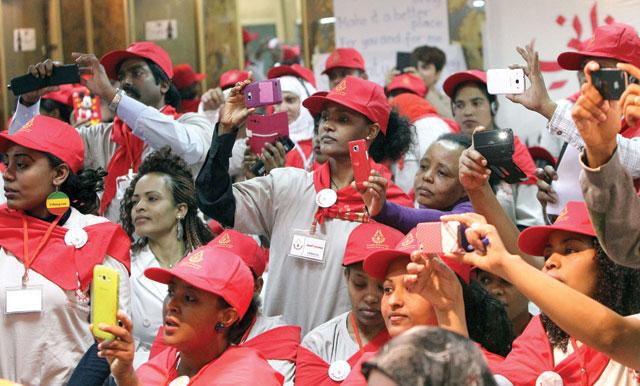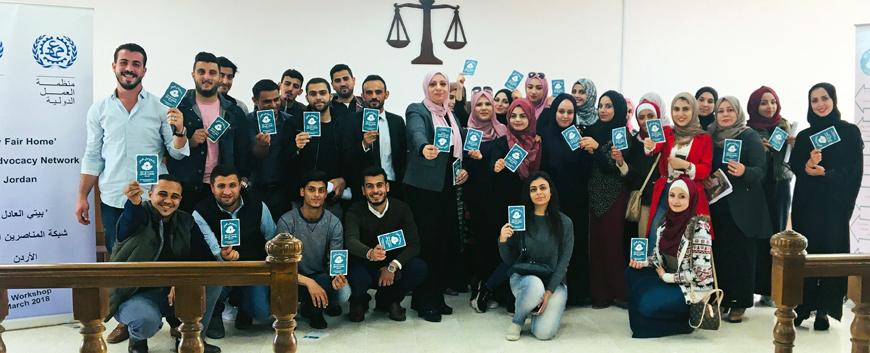You are here
Lebanon migrant domestic workers hope for union to end abuse
By AFP - Jan 26,2015 - Last updated at Jan 26,2015

BEIRUT — Subjected to beatings and rape, and often driven to suicide, migrant domestic workers in Lebanon are trying to form a labour union in what would be a first for the Arab world.
"We want to be treated like human beings, like real workers," said Leticia, a Filipina who was assaulted and raped by her employer several years ago.
"With this union, I will no longer feel alone in the face of abuse," she told AFP.
Leticia joined more than 200 women from Ethiopia, Sri Lanka, Bangladesh and other countries at the founding conference of their hoped-for union in Beirut on Sunday.
Their initiative is unprecedented in the Arab world, which the United Nations says is home to some 30 million migrant workers.
It has the support of the National Federation of Workers' Unions in Lebanon (FENASOL), which says the country has a quarter of a million migrant domestic workers.
But it has yet to win recognition from the government.
Labour Minister Sejaane Azzi told AFP that Lebanese law does not allow foreigners to set up a union, but "new laws are needed to improve the situation of housemaids".
'Job like any other'
"Foreign workers in Lebanon are required to have valid residence and work permits, as well as health insurance," said FENASOL head Castro Abdallah.
"So why is their contract not regulated under the labour law? It's a job like any other."
Rights groups frequently accuse Lebanon and Gulf states of racist and degrading treatment of migrant domestic workers, who are often referred to simply as "servants" or "Sri Lankans", regardless of their nationality.
Although their campaigns have helped raise public awareness, rights activists and union workers say there are no mechanisms in place to protect women when they are mistreated or when contracts are broken.
Gemma, a 48-year-old who has lived in Lebanon since 1993, told AFP: "We domestic workers are not seen as real employees."
The idea of setting up a domestic workers' union emerged after the International Labour Organisation's (ILO) Convention 189 came into force in 2013.
The convention stipulates that domestic workers have the right to at least one day off per week, a minimum wage and to choose where to live and spend their holidays.
Under the controversial "kafala" [sponsorship] system that Lebanon enforces, migrant domestic workers are left at the mercy of their employers.
It restricts workers from moving to a new job before their contracts end unless they obtain their employer's consent, trapping many in abusive situations.
Living conditions can be so abysmal that some countries, including the Philippines, have forbidden their citizens from taking up new work contracts in Lebanon.
"I have a friend whose employer did not allow her to eat any more than a piece of bread and a bit of lettuce, because she did not want her to gain weight," Gemma said.
"Some employers lock up their domestic workers in their rooms, while others won't pay their employees for months at a time."
'Employees, not slaves'
Gemma makes only $150 per month and says there should be a decent minimum wage for migrant domestic workers.
"We are their employees, not their slaves," she said.
Rights groups have repeatedly raised concerns about the plight of Lebanon's domestic workers.
Human Rights Watch said last year that Lebanese authorities were refusing to renew the residence permits of children born to migrant domestic workers.
They began deporting children, often separating them from their mothers.
The New York-based watchdog said in 2008 that there was one suicide a week among migrant domestic workers in Lebanon.
Abdallah said he hopes the new union will establish clear guidelines on migrant workers' rights and duties.
"We hope this will serve as a model for the Arab world," he said.
Related Articles
IRBID — The national coordinator of a campaign aimed at raising employers' awareness on domestic workers' rights and at changing the negativ
Gulf labour ministers Tuesday agreed on minimum terms in the contracts of domestic staff to improve the widely criticised working conditions of over 2.4 million foreign maids, an official said.
LONDON — Lebanon has launched a 24-hour hotline for female domestic workers to allow them to report abuse or mistreatment and receive help.T













